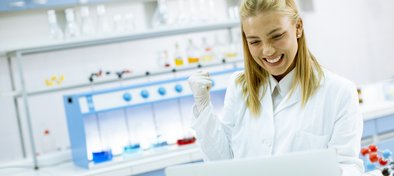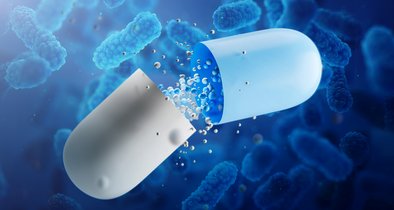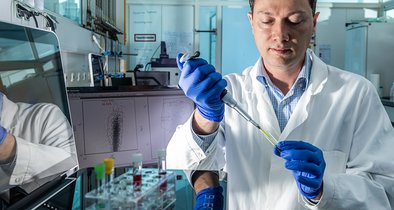Unfolding the microbiome‘s potential
The human microbiome is a highly complex ecosystem composed of bacteria, archaea, fungi, protozoa, and viruses, for which the generic term “microbiota” is widely established. The term “microbiome”, on the other hand, refers to the entire habitat of the microbiota, including the microorganisms, their genomes and the surrounding environmental conditions. This small universe of microorganisms is the subject of intense interest and research in the biochemical and pharmaceutical scientific communities.
The exact constellations and physiological interactions of these bacteria in the human body are considered to be crucial factors in a large number of civilization diseases like cancer, gastrointestinal diseases, respiratory diseases and neurological diseases. Therefore many projects have focused on comparing the microbiomes of healthy subjects with those of patients or persons at-risk. The results of experiments altering the microbiome composition (resulting in “dysbiosis”) support the hypothesis that the microbiota is important in the maintenance of the so called homeostasis – the state of steady internal, physical, and chemical conditions maintained by living systems.
Understanding the roles and functionalities of these microorganisms enables development and production of new classes of therapeutic drugs like live biotherapeutics, probiotics and biosimilars, aimed at re-establishing the balance of the microbiome ecosystem.

Complexity of the microbiota leads to production challenges
Moreover, products based on living microorganisms generally don’t work in a direct way, i.e. targeting specific organs or tissues, but interact in a multifactorial mode of action. Due to the complexity of those interactions it is quite challenging to ensure the required efficacy and reach a reliable quality control. Deeper microbiological understanding during every stage of the production is needed.
LIVE/DEAD Cell Viability
Modern microbiology and especially molecular methods face difficulties in the automated evaluation of live / dead cells as well as the direct observation of microorganisms, their interactions and level of activity in the ecosystem.
Anaerobic microorganisms
The detection and analysis of strictly anaerobic microorganisms represent one of the most challenging areas of research, as anaerobic conditions need to be established to understand microbial activities and to obtain enrichments and pure cultures.
Non-cultivable bacteria
Furthermore, conventional microbiology methods such as cultivation are not an option for the vast majority of the bacteria, since it is estimated that up to 99% of the bacteria present in the human body are non-cultivable.
Improved microbiological analysis
vermicon supports pharmaceutical companies, CDMOs and developers of probiotic bacteria with individually adapted, alternative microbiological methods. Our direct approach allows for identifying and visualizing bacteria directly in their habitat and uncovers mechanisms and correlations that cannot be determined by using only sequence data or conventional cultivation methods. This enables us to provide meaningful answers swiftly and efficiently.

Our services include solutions for all stages of the pharmaceutical production chain, from research and development to the final product:
- microbiological analysis and consulting
- quality control
- process optimization
- development of customer-specific solutions
- test kits and detection systems development

Live Biotherapeutics
To ensure the efficacy and safety of Live Biotherapeutics, a deeper understanding of the relationship between the microbiome and the human health is needed.

Probiotics
Improving the development and production process of probiotic bacteria through direct microbiology. Identity, purity, stability and viability (LIVE/DEAD) analysis directly in the sample.

Expertise and technology
vermicon supports pharmaceutical companies and developers of probiotics whenever a specific microbiological expertise, technological equipment or process optimization is needed.
Publications
Publications and scientific studies by vermicon AG in the field of microbiome research.
Impact of Escherichia coli genotypes on IBS
Microorganisms, 2020 - Symbioflor2® Escherichia coli genotypes enhance ileal and colonic gene expression associated with mucosal defense in gnotobiotic mice. Understanding the individual and the combined impact of the genotypes in the host....
Read moreStability and viability of E. coli and Ent. faecalis
Advanced Biotechnology & Microbiology, 2017 - Survival of probiotic E. coli and Ent. faecalis in the human host after oral intake: results from in vitro and in vivo studies...
Read moreSymbioflor® E. coli: Scientific literature summary
International Journal of Bacteriology, 2016 - A review of research conducted with probiotic E. coli marketed as Symbioflor®. ...
Read moreGenome sequences of Symbioflor2® E. coli
European Journal of Microbiology and Immunology, 2014 - Virulence genes in a probiotic E. coli product with a recorded long history of safe use. The genome sequences were used to identify unique sequences for each component...
Read more
„The importance of bacteria for our health is becoming increasingly obvious. Probiotic drugs open up new avenues in the fight against civilization diseases such as allergies, respiratory diseases and gastrointestinal diseases. With this in mind, SymbioPharm GmbH is committed to consistently and continuously expanding all activities from research to the finished product, searching for new ways and finding unusual treatments.For more than two decades, vermicon AG has been our accompanying, reliable partner in the research development and quality assurance of our products. With their innovative methods, microbiological know-how and professional way of working, we have found exactly the partner that complements us. The fast exchange with our direct contact person and the entire team in mutual trust is the guarantee for an uncomplicated and successful cooperation.“
Dr. Kurt Zimmermann, Chief Scientific Officer (CSO), SymbioPharm GmbH
„Oxabact® is a live biotherapeutics product based on the naturally occurring bacteria Oxalobacter formigenes. OxThera is committed to develop Oxabact® for the treatment of Primary hyperoxaluria, a rare genetic metabolic disorder where different enzyme deficiencies lead to excessive oxalate production.Turning a naturally occurring bacteria into a healthcare product may sound easy, but in reality, it is quite a challenge. As we develop processes for manufacturing and characterization of our product, working with vermicon AG is of tremendous value to us.
The competent, open and innovative minds of our contact persons are outstanding. Combined with the reliability and fast turnaround of the entire vermicon AG team, our relation has translated into a truly powerful and appreciated collaboration.“
Dr. Maria Åkerman, Director Process Research and Development, OxThera
Leading the way in microbiome research
vermicon is a reliable partner of pharmaceutical producers of microbiological drugs and food supplements, CDMOs, as well as other companies and institutes active in the field of microbiome research. What our customers appreciate most about us are our powerful technologies, innovative methods and microbiological expertise, resulting in new insights and process optimization. Cost and time savings are a direct consequence.

Adaptive Expertise
- Flexibility and individual support
- Microbiological know-how
- Internationally recognized experts for FISH and industrial microbiology
- GMP-certified

New Insights
- Alternative detection methods
- Real microbiology through direct microbiology
- High-performance technologies
- Fast and specific results

Process Improvement
- Advanced knowledge
- Powerful, safe and effective products
- Process optimization (cost and resource savings)
- Successfully to the goal



